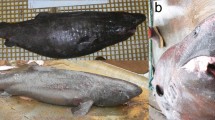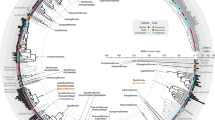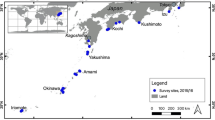Abstract
Most animals consume a narrower range of food resources than is potentially available in the environment, but the underlying basis for these preferences is often poorly understood. Foraging theory predicts that prey selection should represent a trade-off between prey preferences based on nutritional value and prey availability. That is, species should consume preferred prey when available, but select less preferred prey when preferred prey is rare. We employed both field observation and laboratory experiments to examine the relationship between prey selection and preferences in the obligate coral-feeding filefish, Oxymonacanthus longirostris. To determine the drivers of prey selection, we experimentally established prey preferences in choice arenas and tested the consequences of prey preferences for key fitness-related parameters. Field studies showed that individuals fed almost exclusively on live corals from the genus Acropora. While diet was dominated by the most abundant species, Acropora nobilis, fish appeared to preferentially select rarer acroporids, such as A. millepora and A. hyacinthus. Prey choice experiments confirmed strong preferences for these corals, suggesting that field consumption is constrained by availability. In a longer-term feeding experiment, reproductive pairs fed on non-preferred corals exhibited dramatic reductions to body weight, and in hepatic and gonad condition, compared with those fed preferred corals. The majority of pairs fed preferred corals spawned frequently, while no spawning was observed for any pairs fed a non-preferred species of coral. These experiments suggest that fish distinguish between available corals based on their intrinsic value as prey, that reproductive success is dependent on the presence of particular coral species, and that differential loss of preferred corals could have serious consequences for the population success of these dietary specialists.





Similar content being viewed by others
References
Barlow GW (1987) Spawning, eggs and larvae of the longnose filefish Oxymonacanthus longirostris, a monogamous coralivore. Environ Biol Fish 20:183–194
Berumen ML, Pratchett MS (2008) Trade-offs associated with dietary specialization in corallivorous butterflyfishes (Chaetodontidae: Chaetodon). Behav Ecol Sociobiol 62:989–994. doi:10.1007/s00265-007-0526-8
Berumen ML, Pratchett MS, McCormick MI (2005) Within-reef differences in diet and body condition of coral-feeding butterflyfishes (Chaetodontidae). Mar Ecol Prog Ser 287:217–225. doi:10.3354/meps287217
Bonin MC, Munday PL, McCormick MI, Srinivasan M, Jones GP (2009) Coral-dwelling fishes resistant to bleaching but not mortality of host corals. Mar Ecol Prog Ser 394:215–222. doi:10.3354/meps08294
Brooker RM, Munday PL, Jones GP (2011) Coral obligate filefish masquerades as branching coral. Coral Reefs 30:803. doi:10.1007/s00338-011-0779-6
Charnov EL (1976) Optimal foraging: attack strategy of a mantid. Am Nat 110:141–151. doi:10.1086/283054
Chesson J (1983) The estimation and analysis of preference and its relationship to foraging models. Ecology 64:1297–1304. doi:10.2307/1937838
Cole AJ, Pratchett MS, Jones GP (2008) Diversity and functional importance of coral-feeding fishes on tropical coral reefs. Fish Fish 9:286–307. doi:10.1111/j.1467-2979.2008.00290.x
Cole AJ, Pratchett MS, Jones GP (2010) Corallivory in tubelip wrasses: diet, feeding and trophic importance. J Fish Biol 76:818–835. doi:10.1111/j.1095-8649.2009.02530.x
Colwell RK, Futuyma DJ (1971) On the measurement of niche breadth and overlap. Ecology 52:567–576
Cruz-Rivera E, Hay ME (2000) Can quantity replace quality? Food choice, compensatory feeding, and fitness of marine mesograzers. Ecology 81:201–219. doi:10.1890/0012-9658(2000)081[0201:CQRQFC]2.0.CO;2
Gilliam JF, Fraser DF (1987) Habitat selection under predation hazard: test of a model with foraging minnows. Ecology 68:1856–1862. doi:10.2307/1939877
Graham NA (2007) Ecological versatility and the decline of coral-feeding fishes following climate driven coral mortality. Mar Biol 153:119–127. doi:10.1007/s00227-007-0786-x
Heithaus MR, Dill LM (2002) Food availability and tiger shark predation risk influence bottlenose dolphin habitat use. Ecology 83:480–491. doi:10.2307/2680029
Hobson ES (1974) Feeding relationships of teleostean fishes on coral reefs in Kona, Hawaii. Fish Bull 72:915–1031
Hourigan TF, Tricas TC, Reese ES (1988) Coral reef fishes as indicators of environmental stress in coral reefs. In: marine organisms as indicators, 1st edn. Springer, New York
Hughes TP, Baird AH, Bellwood DR, Card M, Connolly SR, Folke C, Grosberg R, Hoegh-Guldberg O, Jackson JBC, Kleypas J, Lough JM, Marshall P, Nystrom M, Palumbi SR, Pandolfi JM, Rosen B, Roughgarden J (2003) Climate change, human impacts, and the resilience of coral reefs. Science 301:929–933. doi:10.1126/science.1085046
Johnson DH (1980) The comparison of usage and availability measurements for evaluating resource preference. Ecology 61:65–71. doi:10.2307/1937156
Keesing JK (1990) Feeding biology of the crown-of-thorns starfish, Acanthaster planci (Linnaeus). PhD dissertation, James Cook University of North Queensland, Townsville, Australia
Kokita T, Nakazono A (1999) Pair territoriality in the longnose filefish, Oxymonacanthus longirostris. Ichthyol Res 46:297–302. doi:10.1007/BF02678516
Kokita T, Nakazono A (2001) Rapid response of an obligately corallivorous filefish Oxymonacanthus longirostris (Monacanthidae) to a mass coral bleaching event. Coral Reefs 20:155–158. doi:10.1007/s003380100153
Kroon FJ, Munday PL, Pankhurst NW (2003) Steroid hormone levels and bi-directional sex change in Gobiodon histrio. J Fish Biol 62:153–167. doi:10.1046/j.1095-8649.2003.00017.x
Laurence WF (1991) Ecological correlates of extinction proneness in Australian tropical rainforest mammals. Conserv Biol 5:79–89. doi:10.1111/j.1523-1739.1991.tb00390.x
Lemine M, Himmelman JH (1996) Relation of food preference to fitness for the green sea urchin, Strongylocentrotus droebachiensis. Mar Biol 127:73–78. doi:10.1007/BF00993646
Lima SL, Dill LM (1990) Behavioural decisions made under risk of predation: a review and prospectus. Can J Zool 68:619–640. doi:10.1139/z90-092
Loya Y, Sakai K, Yamazato K, Sambali H, van Woesik R (2001) Coral bleaching: the winners and the losers. Ecol Lett 4:122–131. doi:10.1046/j.1461-0248.2001.00203.x
Manly BFJ, McDonald LL, Thomas DL (1993) Resource selection by animals. Chapman and Hall, London
Marshall PA, Baird AH (2000) Bleaching of corals on the Great Barrier Reef: differential susceptibilities among taxa. Coral Reefs 19:155–163. doi:10.1007/s003380000086
McCarty JP (2001) Ecological consequences of recent climate change. Conserv Biol 15:320–331. doi:10.1046/j.1523-1739.2001.015002320.x
McNett JB, Rypstra AL (2000) Habitat selection in a large orb-weaving spider: vegetational complexity determines site selection and distribution. Ecol Entomol 25:423–433. doi:10.1046/j.1365-2311.2000.00279.x
Morris DW (1989) Density-dependent habitat selection—testing the theory with fitness data. Evol Ecol 3:80–94. doi:10.1007/BF02147934
Munday PL (2004) Habitat loss, resource specialisation, and extinction on coral reefs. Glob Change Biol 10:1642–1647. doi:10.1111/j.1365-2486.2004.00839.x
Naya DE, Lardies MA, Bozinovic F (2007) The effect of diet quality on physiological and life-history traits in the harvestman Pachylus paessleri. J Insect Physiol 53:132–138. doi:10.1016/j.jinsphys.2006.11.004
Pratchett MS (2007) Dietary selection by coral-feeding butterflyfishes (Chaetodontidae) on the Great Barrier Reef, Australia. Raffles Bull Zool 14:155–160
Pyke GH, Pulliam HR, Charnov EL (1977) Optimal foraging: a selective review of theory and tests. Q Rev Biol 52:137–154
Reaka-Kudla ML (1997) The global biodiversity of coral reefs: a comparison with rainforests. In: Reaka-Kudla ML, Wilson DE, Wilson EO (eds) Biology II: understanding and protecting our biological resources. Joseph Henry Press, Washington, pp 83–108
Travis JMJ (2003) Climate change and habitat destruction: a deadly anthropogenic cocktail. Proc R Soc Lond B 270:467–473. doi:10.1098/rspb.2002.2246
Tricas TC (1989) Prey selection by coral-feeding butterflyfishes: strategies to maximize the profit. Environ Biol Fish 25:171–185. doi:10.1007/BF00002210
Wanless S, Harris MP, Redman P, Speakman JR (2005) Low energy values of fish as a probable cause of a major seabird breeding failure in the North Sea. Mar Ecol Prog Ser 294:1–8. doi:10.3354/meps294001
Wilson S, Bellwood DR (1997) Cryptic dietary components of territorial damselfishes (Pomacentridae, Labroidei). Mar Ecol Prog Ser 153:299–310. doi:10.3354/meps153299
Wilson SK, Graham NAJ, Pratchett MS, Jones GP, Polunin NVC (2006) Multiple disturbances and the global degradation of coral reefs: are reef fishes at risk or resilient? Glob Change Biol 12:2220–2234. doi:10.1111/j.1365-2486.2006.01252.x
Acknowledgments
We wish to thank Reef HQ Aquarium, Orpheus Island Research Station, and Lizard Island Research Station. The Great Barrier Reef Marine Park Authority for financial support. M. McCormick, M. Mitchell, and members of the Jones and Munday laboratories for field assistance. The work described above corresponds to the laws and regulations of Australia under GBRMPA permit G10.33757.1 and animal ethics permit A1399.
Author information
Authors and Affiliations
Corresponding author
Additional information
Communicated by Jeff Shima.
Rights and permissions
About this article
Cite this article
Brooker, R.M., Jones, G.P. & Munday, P.L. Prey selectivity affects reproductive success of a corallivorous reef fish. Oecologia 172, 409–416 (2013). https://doi.org/10.1007/s00442-012-2521-7
Received:
Accepted:
Published:
Issue Date:
DOI: https://doi.org/10.1007/s00442-012-2521-7




